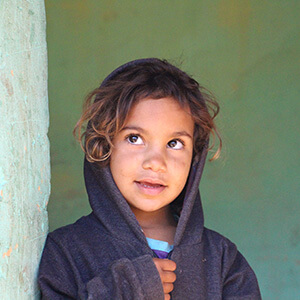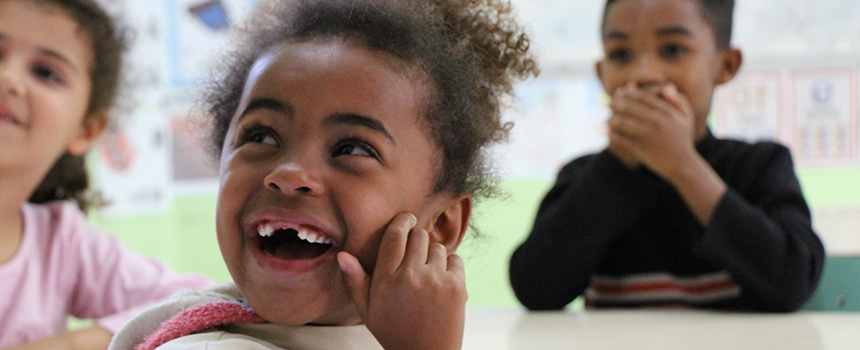 Assistance to day-care centres in the favelas
Assistance to day-care centres in the favelas
Support for children in the slums of Rio de Janeiro
Maria Clara struggles up the hill. Wherever she puts her tiny feet in the colourful flip-flops are rocks, mud and rubbish. Every weekday at just before seven her mother takes the two-year-old by the hand to make her way to the day-care centre. Many children make that way up the hill at that hour – accompanied by their parents or elder siblings. Those that have no one to take them simply cannot go. The way is just too arduous and dangerous. Not only because they might slip and fall, but also because the day-care centre Pintinho Dourado is located in the Complexo 18, a favela in northern Rio de Janeiro. It is not one of the pacified areas: Police and drug gangs regularly have shootouts here, as witnessed by the bullet holes in the wall of the day-care centre. In case of a gun fight, the children have to hide in the centre’s pantry – the safest part of the building.
Necessity
Daily meals for children in Brazilian slums.
Activity
Providing basic foods baskets to poor families as well as regular meals to children and young people in day-care and youth centres.
Countable effort
Number of girls and boys that are provided with a daily meal.
Result
Healthy development as well as increased concentration and performance for the children.
Systemic effect
Improved educational and career prospects for the children.
Background
Historically, income inequality and a high degree of poverty have been problems in Brazil. The country still faces the challenge of overcoming this historical legacy of social injustice. Ten per cent of the population in the state of Rio de Janeiro is living in the so called ‘favelas’. Children living in the slums of Rio not only are in constant danger (from neglect, armed conflict, drug trade, violence), but they also often suffer from hunger.
Almost 700,000 families in the state of Rio de Janeiro rely on state support (known as ‘bolsa família’), which is available to families with an income per head of less than 85 reales (approx. 25 euros) per month. Often, especially for single mothers, these payments are the only source of income. Without regular employment there usually not enough income to ensure a daily meal for the children.
The good deed
Our day-care centres offer a safe environment for children. They are provided with a healthy meal and clean drinking water every day. In spite of their difficult living conditions, this allows them to develop in a healthy way even from early childhood. After school, primary school children attend the child and youth centres, where they take advantage of extra tutoring and remedial education as well as a variety of courses. In order to even be able to focus on learning, again a daily meal is integral to the support. If girl or boys live in extreme poverty, their families are further supported with a basket of basic foods.

AboutBrazil
Brasilia
Capital
207 652 900
Number of inhabitants
8 727
Gross domestic product per capita per year
79
Human Development Index
Brazil is world leader when it comes to social inequality. In terms of income, the average difference between poor and rich citizens is 39.7 per cent.
About the organization and further information
Association
Kinder in Rio e.V.
DZI Seal-of-Approval
Further information and source
- Gori Maia A., Sakamoto C. S., 2016. The impacts of rapid demographic transition on family structure and income inequality in Brazil, 1981–2011. Population Studies. A Journal of Demography. 70(3).
- Lustig N., Lopez-Calva L.F., Oritz-Juarez E., 2012. Declining Inequality in Latin America in the 2000s. The Cases of Argentina, Brazil, and Mexico. World Bank. Policy Research Working Paper 6248(2012): 1-28.




